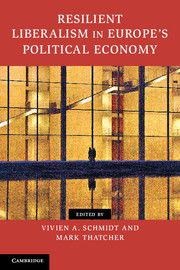Book contents
- Frontmatter
- Contents
- List of figures
- List of tables
- List of contributors
- Preface
- 1 Theorizing ideational continuity: The resilience of neo-liberal ideas in Europe
- Part I Economy, state, and society
- Part II Neo-liberalism in major policy domains
- 5 The collapse of the Brussels–Frankfurt consensus and the future of the euro
- 6 Supranational neo-liberalization: The EU's regulatory model of economic markets
- 7 Resilient neo-liberalism in European financial regulation
- 8 Neo-liberalism and the working-class hero: From organized to flexible labour markets
- 9 European corporate governance: Is there an alternative to neo-liberalism?
- Part III Neo-liberalism in comparative perspective
- Part IV Conclusion
- Index
- References
5 - The collapse of the Brussels–Frankfurt consensus and the future of the euro
Published online by Cambridge University Press: 05 June 2014
- Frontmatter
- Contents
- List of figures
- List of tables
- List of contributors
- Preface
- 1 Theorizing ideational continuity: The resilience of neo-liberal ideas in Europe
- Part I Economy, state, and society
- Part II Neo-liberalism in major policy domains
- 5 The collapse of the Brussels–Frankfurt consensus and the future of the euro
- 6 Supranational neo-liberalization: The EU's regulatory model of economic markets
- 7 Resilient neo-liberalism in European financial regulation
- 8 Neo-liberalism and the working-class hero: From organized to flexible labour markets
- 9 European corporate governance: Is there an alternative to neo-liberalism?
- Part III Neo-liberalism in comparative perspective
- Part IV Conclusion
- Index
- References
Summary
European monetary integration rests on a convergence of views across different countries related to the virtues of stable money and sound finances. This convergence has operated under many different justifications. It was the logical response to the liberalization of international financial markets; it was the price for German participation; and it was the hegemony of neo-liberalism in the battle of ideas. No matter how they explained it, most observers agreed on the existence of a Brussels–Frankfurt consensus underpinning Europe's single currency.
Then the consensus began to falter. The first cracks appeared during the crisis surrounding the stability and growth pact (SGP) in the early 2000s. The tensions mounted with the widening divergence in inflation rates across Eurozone countries and the increasingly volatile euro–dollar exchange rate during the middle of the decade. The consensus shattered completely as the ECB struggled first to manage the global economic and financial crisis and then was found to be responsible for the stabilization of European sovereign-debt markets. Now, the German economics community is openly discontent with the ECB; the ECB and the European Commission are promoting different agendas; and the member states are clearly divided as to what should be the solution.
This chapter explains the collapse of the Brussels–Frankfurt consensus. The argument echoes the main themes of this volume. To the extent that it existed, the ideational consensus underpinning Europe’s single currency was always more rhetoric than reality. The main economic actors couched their policies in the language of sound money and stable finances (or free markets and neutral states); however, they actually behaved more pragmatically than ideologically, and they showed a remarkable willingness to break their own rules.
- Type
- Chapter
- Information
- Resilient Liberalism in Europe's Political Economy , pp. 145 - 170Publisher: Cambridge University PressPrint publication year: 2013
References
- 17
- Cited by



